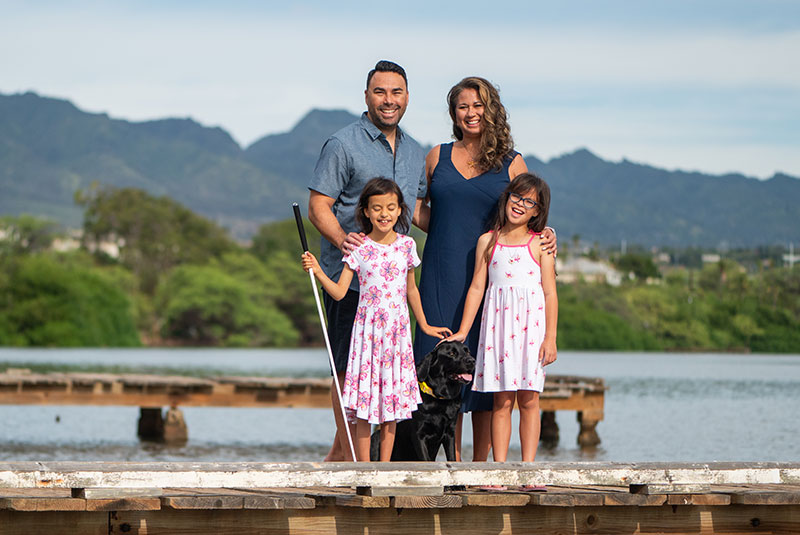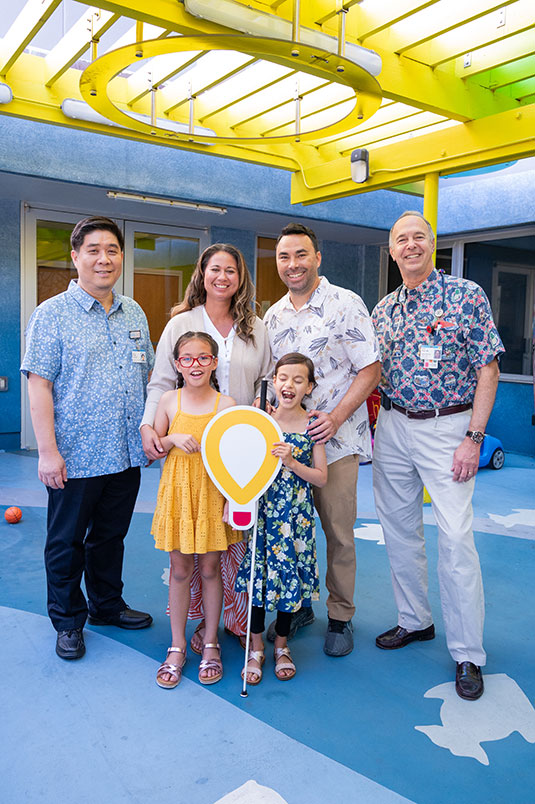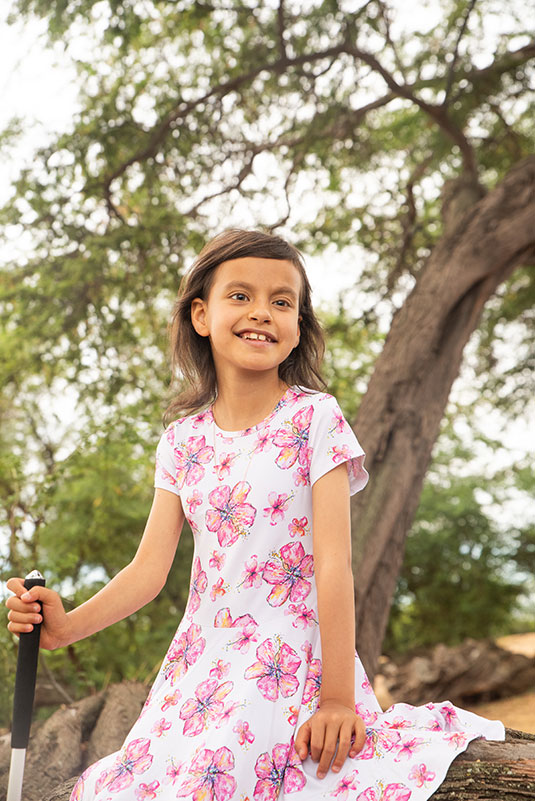Inspire 2024 ANNUAL DONOR REPORT
CMN: A Miracle Child
 Aurelia with her family: (from left) Kaimi, Rachel and Quinn Awa with their dog, Gidget.
Aurelia with her family: (from left) Kaimi, Rachel and Quinn Awa with their dog, Gidget.

Spend a few minutes with Aurelia Awa, and she will probably tell you a joke. Spend a little more time with the spunky sixth grader, and she will fill you in on everything from her favorite books (she just finished reading the Harry Potter series) to music (Aurelia’s a big Bruno Mars fan) to how she wants to change the world one day.
The bubbly young girl can also tell you all about cancer, optic nerve atrophy and cardiac challenges. Aurelia has faced all of it in her 11 years of life.
A Surprising Start
Her journey was not one anyone expected. Rachel Awa had a normal pregnancy. She went into labor on her due date and when their perfect baby was born, Rachel and her husband, Kaimi, named her after a stop they saw during a train ride through Italy — Aurelia Valley. In Latin, it means “golden,” and Aurelia definitely was a golden child.
“Holding her for the first time was such a joy,” Rachel said. “I put her on my chest, and I was just overwhelmed.”
The Awas settled in as new parents and doted on their beautiful baby girl. When she was just 2 weeks old, they noticed what looked like bruises under her eyes that got darker through the day.
After a visit to her pediatrician, tests showed Aurelia’s red blood cell count and platelet levels were extremely low. She needed to go to Kapiolani Medical Center for Women & Children for additional tests.

The Awas with Dr. James Sim (far left), Kapiolani pediatric cardiologist, and Dr. Darryl Glaser (far right), Kapiolani pediatric oncologist/hematologist.
The family spent more than a week at the medical center, then returned home. Two days later, Aurelia was having trouble breathing. She was admitted to Kapiolani’s Pediatric Intensive Care Unit where a ventilator helped get oxygen into her little body. There, Rachel told the team that she noticed small bumps on her daughter’s head.
“It was a mystery at first,” said Dr. Darryl Glaser, Kapiolani pediatric hematologist and oncologist. “Abnormal blood counts indicated leukemia, but we couldn’t find leukemia cells in her bone marrow or blood. Aurelia had a very unusual case where leukemia cells clumped together in different areas of her body: spots on her skin, around her sinuses which made it difficult to breathe, and in lumps on her skin and behind her eyes.”
Biopsies finally revealed the diagnosis: Aurelia had acute myeloid leukemia. The Kapiolani team had to move quickly.
“The first round of chemotherapy was really challenging,” Rachel said. “The fear and anger of the unknown hit me the hardest.”
Aurelia was only 4 weeks old when she began the first of four rounds of chemotherapy, as well as platelet and red blood cell transfusions. After a few weeks, she was able to breathe on her own, so the ventilator was removed. Rachel and Kaimi were relieved that Aurelia was finally on the road to recovery. Then, they noticed their baby would not look at them.
Doctors confirmed their fears. The cancer had damaged Aurelia’s optic nerve. She was blind.
“I just remember being so scared. How is she going to live her life? How is she going to run and play?” Rachel said. “All these emotions started coming all at once and I felt really defeated.”
As Aurelia grew, her parents adjusted to a more verbal lifestyle. They talked their toddler through her first steps, navigating their home and so much more. Their little one blossomed. She started speaking at an early age and was soon reading and writing.
Challenges of the Heart
The Awa family was growing, too. Rachel was pregnant again. Aurelia loved talking to her mom’s tummy and was excited the day daughter number two, Quinn, came home. As they got older, the sisters grew closer.
However, Aurelia’s health challenges were not over. When she was 4, she began to get really fatigued. At Kapiolani, the Awas received guidance from pediatric cardiologist Dr. James Sim.
“One of the side effects of chemotherapy is that it can affect the heart, so we follow certain patients closely,” Dr. Sim said. “An echocardiogram showed signs that Aurelia was in significant heart failure.”
“We focused on what we needed to do,” Kaimi said. “With medication, she started to get her energy back and continued her normal life.”
Three years later, Rachel and Kaimi saw that their petite daughter’s appetite was changing. Two bites would fill her up. Eventually, Aurelia was eating so little that her blood sugar would drop to a point where she would get sick or even experience seizures. The Kapiolani team inserted a gastrostomy tube to deliver extra nutrients directly to Aurelia’s stomach.
At 9, Aurelia started feeling weak and her body was getting bloated. Her heart was failing again. The Kapiolani team was there again to treat Aurelia and adjust her medication.
“One of the great things about Kapiolani is that there are so many different specialists in one place,” Dr. Glaser said. “Cardiologists, gastroenterologists, endocrinologists, neurologists, physical and occupational therapists; everybody always comes together for Aurelia.”
“To this day, the people at Kapiolani are our second family,” Rachel said. “Whenever we are there, Dr. Glaser and all of Aurelia’s different doctors and nurses will come to visit. You can see their commitment and love for their patients.”
An Inspiring Future
At 10, Aurelia received a gift her family truly treasures. She was officially cancer free. Aurelia and Quinn turned a planned celebration into a toy drive and gathered more than 80 toys for Kapiolani patients.

“She’s amazing,” Rachel said. “Her blindness does not stop her. Her heart failure does not stop her. She’s tiny but mighty.”
“She’s braver than my heart will allow sometimes,” Kaimi said. “One time, she set up a little ramp and was sliding off the couch, sitting in a laundry basket, down the ramp. She is not fearful; she just goes for it.”
True to form, Aurelia is tackling her new role as 2025 Kapiolani Children’s Miracle Network Champion without hesitation. What excites her most is the opportunity to share her story with other kids facing seemingly insurmountable challenges, to let them know that things will be OK.
In fact, the first thing the active preteen did as Champion was sit down and write speeches. She’s finished five so far and is ready to deliver them at any time. All you need to do is ask.
“Ever wonder why Kapiolani is such a great hospital? It's because it helps you with heart problems, kidney problems, cancers and so much more,” she read. “It is a hospital that helped me and will help other kids stay alive.
“Mahalo and thank you for donors who donated to kids like me and help them survive. When you donate, they know you care.”

